During the 1950s and 1960s, beautiful Italian actress and singer Giorgia Moll (1938) could often be seen on television and in the cinema, especially in many Italian B-films. With her pretty face and dream measurements, she also became a popular cover and pin-up model.

Big Italian card by Bromofoto, Milano. Photo: Günther Wagner / Pelikan.
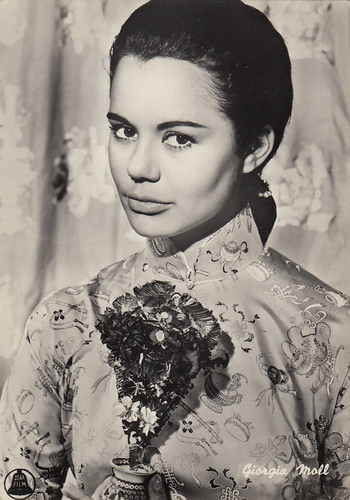
Italian postcard by Bromofoto, Milano, no. 1366. Photo: Dear Film. Giorgia Moll, as Vietnamese character Phuong, in The Quiet American (Joseph L. Mankiewicz, 1958). Collection: Marlene Pilaete.
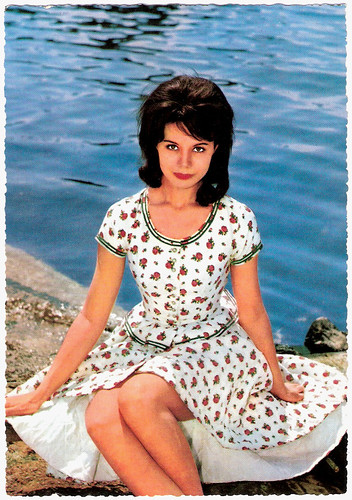
German postcard by Krüger, no. 902/49.
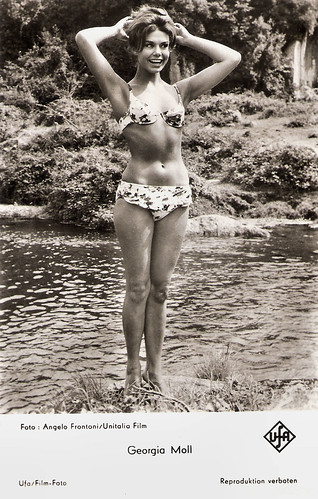
German postcard by Ufa, Berlin-Tempelhof, no. FK 4954. Photo: Angelo Frontoni / Unitalia Film.
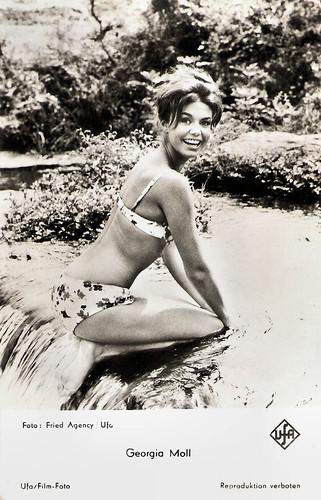
German postcard by Ufa, Berlin-Tempelhof, no. FK 5171. Photo: Fried Agency / Ufa.
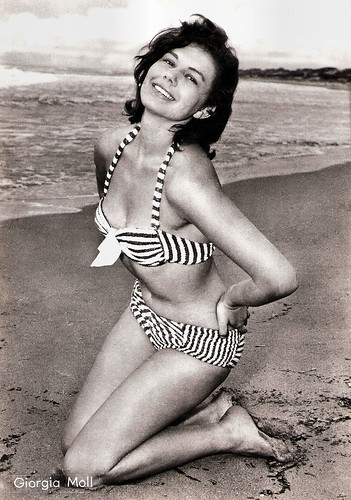
Italian postcard by Bromostampa, Milano, no. 174.
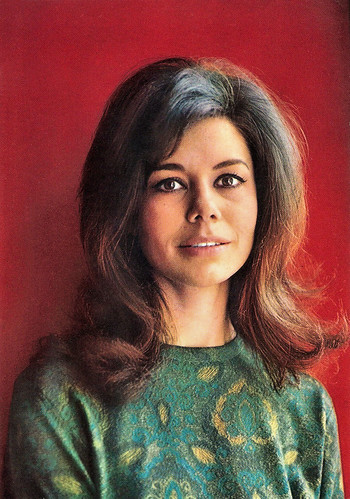
Italian postcard by Rotalfoto, Milano, no. N. 164.
Giorgia (also Georgia) Moll was born in Prata de Pordenone (some sources say Rome), Italy, in 1938 to a German father and an Italian-German mother.
Still very young, she started as a model for advertisements of Carosello reclamizzante, an in Italy well-known Italian toothpaste product. In 1955, she won the beauty contest Miss Cinema. Producer Carlo Ponti suggested she take a screen test. Only seventeen, she was hired for her first film, Non scherzare con le donne / Don't Trifle with Women (Giuseppe Bennati, 1955) with Rossana Podestà.
Moll figured in such Italian films as the comedy Lo svitato / Unscrew Him (Carlo Lizzani, 1955) starring Dario Fo, Mio figlio Nerone / My Son Nero (Steno, 1956) with Alberto Sordi and Gloria Swanson, and Mariti in città / Husbands in the City (Luigi Comencini, 1957) opposite Renato Salvatori.
At the time, she was reportedly a girlfriend of Joe DiMaggio, the legendary baseball player and former husband of Marilyn Monroe. Later, she had a tempestuous affair with actor John Barrymore Jr., Drew Barrymore’s father.
Most of her films were undistinguished comedies and Peplums, but she did appear in a few well-known productions. Her biggest film was The Quiet American (Joseph L. Mankiewicz, 1958), based on Graham Greene's prophetic novel about U.S. foreign policy failure in pre-war Indochina, and starring American actor and war hero Audie Murphy. The film was shot in Cinécitta with some location shooting in Saigon. Moll played Phuong, Murphy's Vietnamese mistress. The part gave her a certain international notoriety. The Quiet American was critically well-received, but was not a box office success.
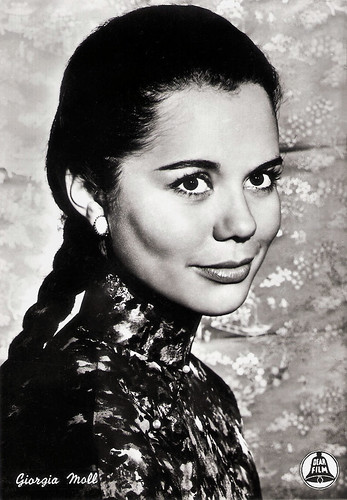
Italian postcard by Bromofoto, Milano, no. 1616. Photo: Dear Film. Publicity still for The Quiet American (Joseph L. Mankiewicz, 1958).
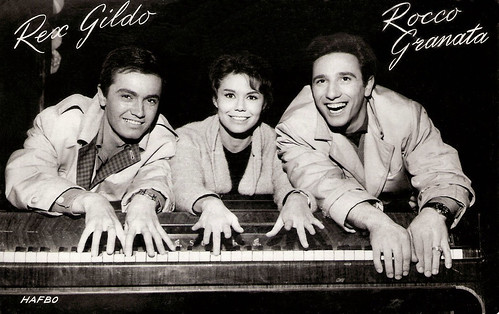
Dutch postcard by Uitg. Takken, Utrecht, no. AX 4687. Photo: Hafbo. Publicity still for the Schlagerfilm Marina (Paul Martin, 1960), which was distributed in Holland as Teenagers Schlager Parade. Moll played the title character, and she poses here between Schlager stars Rex Gildo and Rocco Granata, singer of the hit song 'Marina'.

German postcard by Kolibri-Verlag G.m.b.H., Minden/Westf., no. 1212. Photo: Grimm / CCCfilm / Gloria. Bubi Scholz and Georgia Moll in Marina (Paul Martin, 1960).
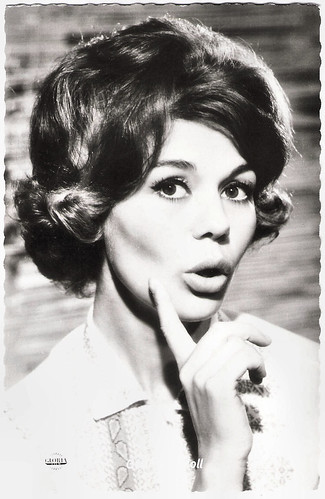
German postcard by Kolibri-Verlag G.m.b.H., Minden/Westf., no. 1357. Photo: Grimm / CCC-film / Gloria. Publicity still for Marina (Paul Martin, 1960).
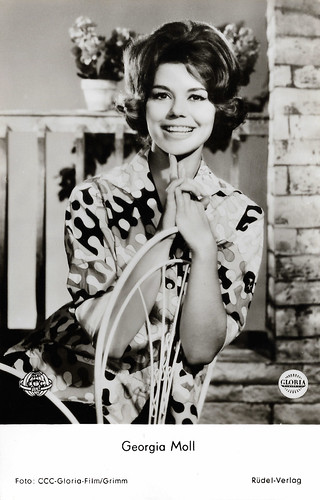
German postcard by Rüdel-Verlag, Hamburg-Bergedorf, no. 3062. Photo: Grimm / CCC-film / Gloria. Publicity still for Marina (Paul Martin, 1960).
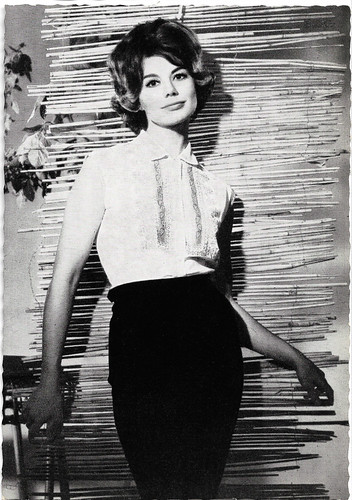
German postcard by Filmvertrieb Ernst Freihoff, Essen, no. 637. Photo: CCC Gloria Film / Grimm. Publicity still for Marina (Paul Martin, 1960).

Italian postcard by Rotalfoto, Milano, no. 866.
Giorgia Moll was critically appreciated for her dramatic performance in Damiano Damiani's feature debut, the crime drama Il rossetto / Lipstick (1960) with Pierre Brice. In 1963, she appeared in Jean-Luc Godard’s classic film-about-film Le Mépris / The Contempt (1963), which starred Brigitte Bardot. Moll played Francesca Vanini, the secretary of the authoritarian film producer (Jack Palance), who works as a translator for the film’s protagonist, a script-writer played by Michel Piccoli.
Another classic in which she played a supporting part is the drama Incompresa / Misunderstood (Luigi Comencini, 1967). In this unforgettable tearjerker, Anthony Quayle plays a widower who tragically misunderstands his eldest son’s brave front as being unaffected by his mother's death.
During the 1960s, Georgia Moll also became known as a singer. She recorded some singles, of which 'Ballata per un amore perduto' / 'Nato in settembre' (Ballad for a Lost Love / Born in September, 1964) is best known. The author of the texts of both songs is Piero Ciampi, and the arranger and composer of 'Nato in settembre' is Elvio Monti.
With her harmonious face, her perfect brown hair and her dream measurements, she was also a popular pin-up model in this period, for instance in the magazine Playmen in 1972. After 1970, her appearances became sporadic, and she retired from the cinema in 1985.
Her last screen appearances were in the film Tutti dentro / Everybody in Jail (Alberto Sordi, 1984) with Alberto Sordi and Joe Pesci, and the TV film I due prigionieri / The Two Prisoners (Anton Giulio Majano, 1985) with Ray Lovelock and Alain Cuny. Later, Giorgia Moll became a photographer.
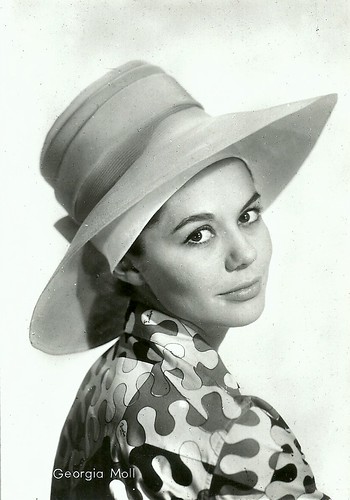
Italian postcard, no. 592.
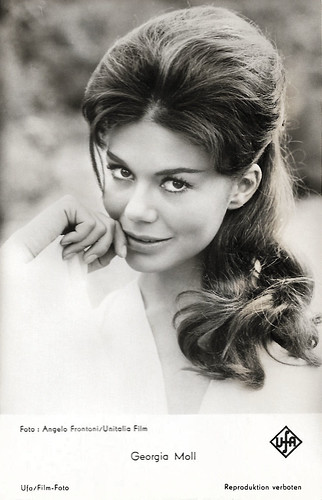
German postcard by Ufa, Berlin-Tempelhof, no. FK 4971. Photo: Angelo Frontoni / Unitalia Film.
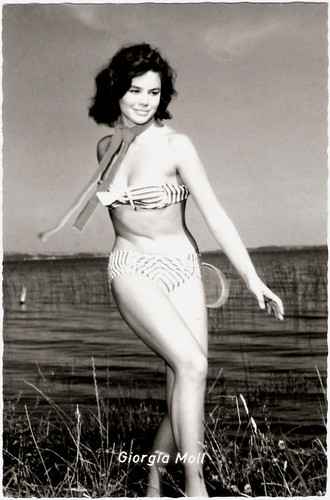
German postcard by Kolibri-Verlag G.m.b.H., Minden / Westf., no. 1666.
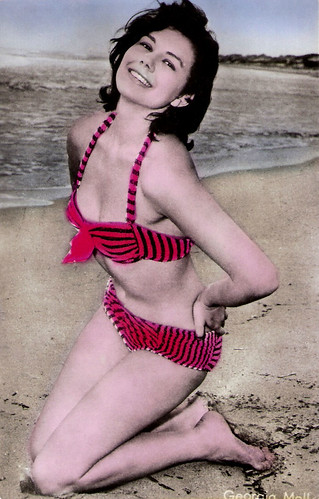
Serbian postcard by Studio Sombor, no. 276.
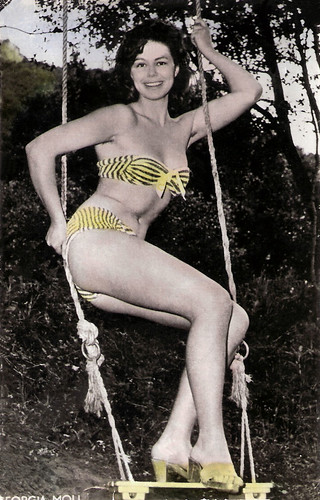
Serbian postcard by Studio Sombor, no. 276. Sent by mail in Yugoslavia in 1965.
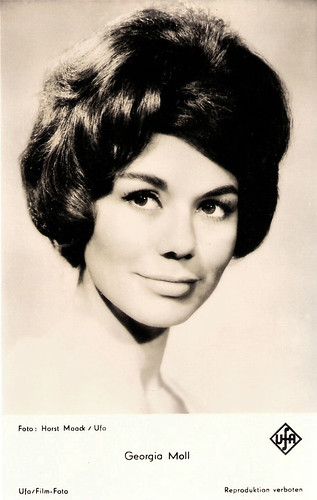
German postcard by Universum-Film Aktiengesellschaft (Ufa), Berlin-Tempelhof, no. FK 4860. Retail price: 25 Pfg. Photo: Horst Maack / Ufa.
Trailer for Le Mépris / The Contempt (1963). Source: The Cultbox (YouTube).
Sources: Guy Bellinger (IMDb), Glamour Girls of the Silver Screen, Wikipedia (English and Italian) and IMDb.
This post was last updated on 13 November 2025.

Big Italian card by Bromofoto, Milano. Photo: Günther Wagner / Pelikan.

Italian postcard by Bromofoto, Milano, no. 1366. Photo: Dear Film. Giorgia Moll, as Vietnamese character Phuong, in The Quiet American (Joseph L. Mankiewicz, 1958). Collection: Marlene Pilaete.

German postcard by Krüger, no. 902/49.

German postcard by Ufa, Berlin-Tempelhof, no. FK 4954. Photo: Angelo Frontoni / Unitalia Film.

German postcard by Ufa, Berlin-Tempelhof, no. FK 5171. Photo: Fried Agency / Ufa.

Italian postcard by Bromostampa, Milano, no. 174.

Italian postcard by Rotalfoto, Milano, no. N. 164.
Tempestuous affair
Giorgia (also Georgia) Moll was born in Prata de Pordenone (some sources say Rome), Italy, in 1938 to a German father and an Italian-German mother.
Still very young, she started as a model for advertisements of Carosello reclamizzante, an in Italy well-known Italian toothpaste product. In 1955, she won the beauty contest Miss Cinema. Producer Carlo Ponti suggested she take a screen test. Only seventeen, she was hired for her first film, Non scherzare con le donne / Don't Trifle with Women (Giuseppe Bennati, 1955) with Rossana Podestà.
Moll figured in such Italian films as the comedy Lo svitato / Unscrew Him (Carlo Lizzani, 1955) starring Dario Fo, Mio figlio Nerone / My Son Nero (Steno, 1956) with Alberto Sordi and Gloria Swanson, and Mariti in città / Husbands in the City (Luigi Comencini, 1957) opposite Renato Salvatori.
At the time, she was reportedly a girlfriend of Joe DiMaggio, the legendary baseball player and former husband of Marilyn Monroe. Later, she had a tempestuous affair with actor John Barrymore Jr., Drew Barrymore’s father.
Most of her films were undistinguished comedies and Peplums, but she did appear in a few well-known productions. Her biggest film was The Quiet American (Joseph L. Mankiewicz, 1958), based on Graham Greene's prophetic novel about U.S. foreign policy failure in pre-war Indochina, and starring American actor and war hero Audie Murphy. The film was shot in Cinécitta with some location shooting in Saigon. Moll played Phuong, Murphy's Vietnamese mistress. The part gave her a certain international notoriety. The Quiet American was critically well-received, but was not a box office success.

Italian postcard by Bromofoto, Milano, no. 1616. Photo: Dear Film. Publicity still for The Quiet American (Joseph L. Mankiewicz, 1958).

Dutch postcard by Uitg. Takken, Utrecht, no. AX 4687. Photo: Hafbo. Publicity still for the Schlagerfilm Marina (Paul Martin, 1960), which was distributed in Holland as Teenagers Schlager Parade. Moll played the title character, and she poses here between Schlager stars Rex Gildo and Rocco Granata, singer of the hit song 'Marina'.

German postcard by Kolibri-Verlag G.m.b.H., Minden/Westf., no. 1212. Photo: Grimm / CCCfilm / Gloria. Bubi Scholz and Georgia Moll in Marina (Paul Martin, 1960).

German postcard by Kolibri-Verlag G.m.b.H., Minden/Westf., no. 1357. Photo: Grimm / CCC-film / Gloria. Publicity still for Marina (Paul Martin, 1960).

German postcard by Rüdel-Verlag, Hamburg-Bergedorf, no. 3062. Photo: Grimm / CCC-film / Gloria. Publicity still for Marina (Paul Martin, 1960).

German postcard by Filmvertrieb Ernst Freihoff, Essen, no. 637. Photo: CCC Gloria Film / Grimm. Publicity still for Marina (Paul Martin, 1960).

Italian postcard by Rotalfoto, Milano, no. 866.
Unforgettable tearjerker
Giorgia Moll was critically appreciated for her dramatic performance in Damiano Damiani's feature debut, the crime drama Il rossetto / Lipstick (1960) with Pierre Brice. In 1963, she appeared in Jean-Luc Godard’s classic film-about-film Le Mépris / The Contempt (1963), which starred Brigitte Bardot. Moll played Francesca Vanini, the secretary of the authoritarian film producer (Jack Palance), who works as a translator for the film’s protagonist, a script-writer played by Michel Piccoli.
Another classic in which she played a supporting part is the drama Incompresa / Misunderstood (Luigi Comencini, 1967). In this unforgettable tearjerker, Anthony Quayle plays a widower who tragically misunderstands his eldest son’s brave front as being unaffected by his mother's death.
During the 1960s, Georgia Moll also became known as a singer. She recorded some singles, of which 'Ballata per un amore perduto' / 'Nato in settembre' (Ballad for a Lost Love / Born in September, 1964) is best known. The author of the texts of both songs is Piero Ciampi, and the arranger and composer of 'Nato in settembre' is Elvio Monti.
With her harmonious face, her perfect brown hair and her dream measurements, she was also a popular pin-up model in this period, for instance in the magazine Playmen in 1972. After 1970, her appearances became sporadic, and she retired from the cinema in 1985.
Her last screen appearances were in the film Tutti dentro / Everybody in Jail (Alberto Sordi, 1984) with Alberto Sordi and Joe Pesci, and the TV film I due prigionieri / The Two Prisoners (Anton Giulio Majano, 1985) with Ray Lovelock and Alain Cuny. Later, Giorgia Moll became a photographer.

Italian postcard, no. 592.

German postcard by Ufa, Berlin-Tempelhof, no. FK 4971. Photo: Angelo Frontoni / Unitalia Film.

German postcard by Kolibri-Verlag G.m.b.H., Minden / Westf., no. 1666.

Serbian postcard by Studio Sombor, no. 276.

Serbian postcard by Studio Sombor, no. 276. Sent by mail in Yugoslavia in 1965.

German postcard by Universum-Film Aktiengesellschaft (Ufa), Berlin-Tempelhof, no. FK 4860. Retail price: 25 Pfg. Photo: Horst Maack / Ufa.
Trailer for Le Mépris / The Contempt (1963). Source: The Cultbox (YouTube).
Sources: Guy Bellinger (IMDb), Glamour Girls of the Silver Screen, Wikipedia (English and Italian) and IMDb.
This post was last updated on 13 November 2025.
No comments:
Post a Comment